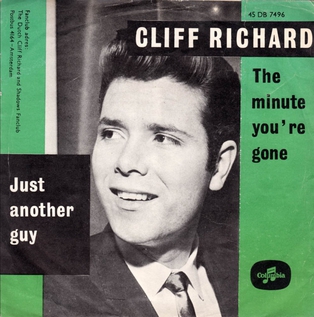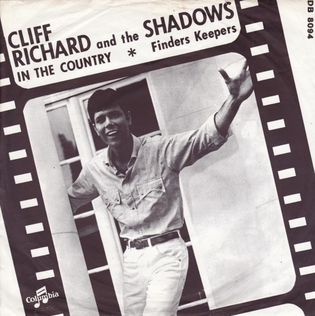"This Ole House" is an American popular song written by Stuart Hamblen, and published in 1954. Rosemary Clooney's version reached the top of the popular music charts in both the US and the UK in 1954. The song again topped the UK chart in 1981 in a recording by Shakin' Stevens.

Sir Cliff Richard is a British singer and actor who made his professional debut in August 1958. His discography consists of 47 studio albums, seven soundtrack albums, 11 live albums, three stage show cast albums, 17 mainstream compilation albums, seven box sets, eight gospel compilation albums, 46 EPs and 146 singles. It also includes numerous budget/mid-price compilation albums, repackaged albums and one remix album. These figures are based on Richard's releases in his native UK plus a small number of new music releases for specific markets such as France, West Germany, Japan, and the United States. There have been many additional compilation albums and singles released outside the UK that are too numerous to include; however, some of the more successful or notable singles released outside the UK have been included in the Singles section.
"Blue Turns to Grey" is a song that was written by Mick Jagger and Keith Richards. The song first appeared in February 1965 when both Dick and Dee Dee and The Mighty Avengers released versions of it as singles. Another version was released shortly thereafter by Tracey Dey on Amy Records. On Dey's single, the label credits the song to "K. Richard-A. Oldham"—Oldham being the surname of the Rolling Stones' then-manager/producer Andrew Loog Oldham. It was released by The Rolling Stones on their 1965 US-only album December's Children later that year. On this album, "Blue Turns to Grey" as well as "The Singer Not the Song" features Brian Jones on a 12-string electric guitar and Keith on a 6-string. It did not see a UK release until the 1971 compilation album Stone Age.

"The Twelfth of Never" is a popular song written in 1956 and first recorded by Johnny Mathis the following year. The title is a popular expression, which is used as the date of a future occurrence that will never come to pass. In the case of the song, "the 12th of Never" is given as the date on which the singer will stop loving his beloved, thus indicating that he will always love her.

"The Next Time" backed with "Bachelor Boy" was the first of three number one hit singles from the Cliff Richard musical, Summer Holiday. Both sides were marketed as songs with chart potential, and the release is viewed retroactively as a double A-side single. However, technically double A-sides were not regarded as such until 1965, so "The Next Time" was pressed as the A-side, with "Bachelor Boy" the B-side. The song was succeeded at number one by The Shadows' "Dance On!".

"The Young Ones" is a single by Cliff Richard and the Shadows. The song, written by Sid Tepper and Roy C. Bennett, is the title song to the 1961 film The Young Ones and its soundtrack album.

"Summer Holiday" is a song recorded by Cliff Richard and The Shadows, written by rhythm guitarist Bruce Welch and drummer Brian Bennett. It is taken from the film of the same name, and was released as the second single from the film in February 1963. It went to number one in the UK Singles Chart for a total of three weeks, as had the first single from the film, "The Next Time". After "Summer Holiday" had spent two weeks at number one, The Shadows' instrumental "Foot Tapper"—also from the same film—took over the top spot for one week, before "Summer Holiday" returned to the top spot for one further week. The track is one of Richard's best known titles and it remains a staple of his live shows. It was one of six hits Richard performed at his spontaneous gig at the 1996 Wimbledon Championships when rain stopped the tennis.

"Please Don't Tease" is a 1960 song recorded by Cliff Richard and the Shadows. Recorded in March and released as a single in June, the song became their third No. 1 on the UK Singles Chart spending three weeks at the summit. The song was written by the Shadows' rhythm guitarist Bruce Welch together with Pete Chester.

"Power to All Our Friends" is a song by Cliff Richard which was chosen as the British entry to the Eurovision Song Contest 1973, by a postal vote which was decided by BBC viewers after Richard performed six contending songs on A Song For Europe, featured on Cilla Black's BBC1 Saturday evening show Cilla. The runner-up song was "Come Back Billie Jo", written by Mitch Murray and Tony Macaulay, which was included as the B-side on the single. "Power to All Our Friends" came third in the Eurovision Song Contest.

"The Minute You're Gone" is a song written by Jimmy Gateley, a Nashville, Tennessee based fiddle player and singer, for Sonny James in 1963. This song originally made No. 95 in the US charts and No. 9 in the country charts for Sonny James in 1963.
Lucky Lips is a song written by Jerry Leiber and Mike Stoller. It was originally recorded by Ruth Brown in 1956 and was successfully covered by Cliff Richard in 1963.
"I'm Lookin' out the Window" is a ballad written by Don Raye and John Jacob Niles. Peggy Lee first recorded the song as a B-side for her 1959 single "Hallelujah, I Love Him So". The song is best known as a hit record for Cliff Richard in 1962 in numerous countries, although not in the United States.
"L'Edera" is an Italian language song, written by Saverio Seracini and Vincenzo D'Acquisto. The song premiered at the 8th Sanremo Music Festival in January 1958, being performed first by Nilla Pizzi and then Tonina Torrielli, with separate performances, and placing second in the competition, behind "Nel blu dipinto di blu" by Domenico Modugno and Johnny Dorelli. "L'Edera" was later recorded by several Italian artists, including Claudio Villa.
"It'll Be Me" is a song written by Jack Clement, first released in April 1957 by Jerry Lee Lewis, as B-side to his single "Whole Lot of Shakin' Going On".

"Wired for Sound" is a song recorded by English singer Cliff Richard, released in 1981 as the lead single for his album of the same name. The song reached number 4 in the UK Singles Chart and was certified silver by the BPI for sales over 250,000. The song reached number 2 in Australia and South Africa, and was a hit in a number of European countries. The song was written by Alan Tarney and B.A. Robertson.

"On the Beach" is a 1964 hit song by Cliff Richard and the Shadows. It was taken from and released in the lead up to the release of the film Wonderful Life and its soundtrack. It become an international hit for Richard, reaching number 7 in the UK Singles Chart and charting in Australia (No. 4), Ireland (No. 6), Norway (No. 4), South Africa (No. 2) and Sweden (No. 12).

"Early in the Morning" is a song by British band Vanity Fare, released as a single in June 1969. It became an international hit, peaking at number 8 on the UK Singles Chart and number 12 on the Billboard Hot 100 and was awarded a gold disc for sales over one million.

"In the Country" is a song by Cliff Richard and the Shadows, released as a single in December 1966. It peaked at number 6 on the UK Singles Chart.

"It's All Over" is a song by the Everly Brothers, released as a single in December 1965 from their album In Our Image.
"I'll Come Running" is a song written by Neil Diamond. It was first released by Diamond in July 1966 as the B-side to his US top-ten single "Cherry, Cherry", before being included on his debut album The Feel of Neil Diamond, released in August 1966. The song was later covered by Cliff Richard and released as a single in June 1967; it peaked at number 26 in the UK Singles Chart.













